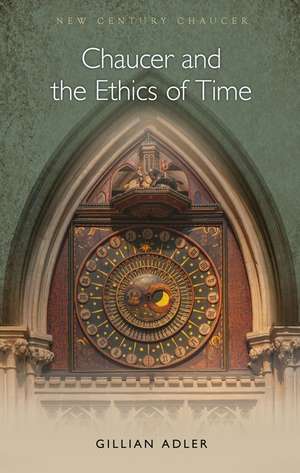Chaucer and the Ethics of Time: New Century Chaucer
Autor Gillian Adleren Limba Engleză Hardback – 22 iun 2022
Geoffrey Chaucer wrote at a turning point in the history of timekeeping, but many of his poems demonstrate a greater interest in the moral dimension of time than in the mechanics of the medieval clock. Chaucer and the Ethics of Time examines Chaucer’s sensitivity to the insecurity of human experience amid the temporal circumstances of change and time-passage, as well as strategies for ethicising historical vision in several of his major works. While wasting time was occasionally viewed as a sin in the late Middle Ages, Chaucer resists conventional moral dichotomies and explores a complex and challenging relationship between the interior sense of time and the external pressures of linearism and cyclicality. Chaucer’s diverse philosophical ideas about time unfold through the reciprocity between form and discourse, thus encouraging a new look at not only the characters’ ruminations on time in the tradition of St Augustine and Boethius, but also manifold narrative sequences and structures, including anachronism.
Preț: 482.94 lei
Preț vechi: 569.97 lei
-15% Nou
Puncte Express: 724
Preț estimativ în valută:
92.42€ • 100.36$ • 77.63£
92.42€ • 100.36$ • 77.63£
Carte nepublicată încă
Doresc să fiu notificat când acest titlu va fi disponibil:
Se trimite...
Preluare comenzi: 021 569.72.76
Specificații
ISBN-13: 9781786838360
ISBN-10: 1786838362
Pagini: 256
Dimensiuni: 140 x 216 x 20 mm
Greutate: 0.4 kg
Editura: University of Wales Press
Colecția University of Wales Press
Seria New Century Chaucer
ISBN-10: 1786838362
Pagini: 256
Dimensiuni: 140 x 216 x 20 mm
Greutate: 0.4 kg
Editura: University of Wales Press
Colecția University of Wales Press
Seria New Century Chaucer
Notă biografică
Gillian Adler is assistant professor of literature at Sarah Lawrence College in New York.
Cuprins
List of Abbreviations 6
Introduction 7
1 Elegiac Time and the Pleasure of Forgetting in the Book of the Duchess 34
2 Seeing Time and the Illusion of Control in Troilus and Criseyde 62
3 ‘What may ever laste?’: Narrativising Transience in the House of Fame 108
4 The Process of Time in the Parliament of Fowls137
5 Nonlinear Time in Chaucer’s Frame-Narrative and the Wife of Bath’s Prologue160
Conclusion187
Notes195
Bibliography233
Introduction 7
1 Elegiac Time and the Pleasure of Forgetting in the Book of the Duchess 34
2 Seeing Time and the Illusion of Control in Troilus and Criseyde 62
3 ‘What may ever laste?’: Narrativising Transience in the House of Fame 108
4 The Process of Time in the Parliament of Fowls137
5 Nonlinear Time in Chaucer’s Frame-Narrative and the Wife of Bath’s Prologue160
Conclusion187
Notes195
Bibliography233


